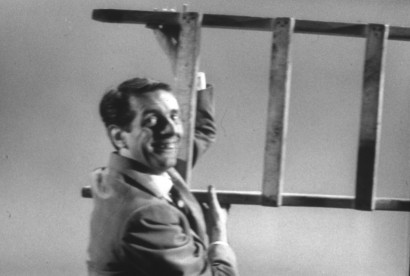DARIO FO – Theater Author, Actor and Director

(San Giano (VA), 1926 – 2016)
Dario Fo was born on March 26, 1926 in a humble family of the province of Varese. His father was the controller of a small train station and his mother was a farmer. Since the early years of his childhood Dario was immersed in the atmosphere of the theater, in the shade of his father who was also an amateur actor in a small theater company, and Dario’s fantasy was stimulated by his mother, who was a talented and imaginative woman. Dario spent his vacations on his grandfather’s farm in Lomellina. His grandfather was a traveling merchant and little Dario accompanied him in his journeys to sell products. To attract customers, grandfather Rota invented and told incredible stories inserting in them news and anecdotes about local events. It was from his grandfather that Dario learned the first rudiments of narrative rhythm on the field. In 1940 he attended the Academy of Brera and after the war he started his studies in Architecture at the Milan Polytechnic but he did not complete them.
He was forcefully drafted into the Army of the Salò Republic but he was able to escape and hide for a few months in the attic of a store. Meanwhile his father was helping many Jewish people to run away to Switzerland and his mother took care of wounded partisans. In 1945 he turned his interest to set designing and began to improvise monologues, drawing closer to the world of the theater. In those years he began a friendship with artists such as Cassinari, Tadini, Morlotti, Treccani, and Vittorini also thanks to his mother’s hospitality as she welcomed them all at home. His first text was Poer nano a comic parody of the story of Cain and Abel. Thanks to this satire Dario Fo became a member of the theater company of Franco Parenti. This was the beginning of a multifaceted and prolific theater production, always in balance between political satire and the genuine comic verve of folk theater, and through which the professional and life relationship with Franca Rame became increasingly consolidated. After entering the variety shows with Who has seen this man? in 1962 conducted by Vito Molinari, that had a discreet success, Dario was called to present the 1962 edition of Canzonissima together with Franca Rame, but he left the show during the course of programming because of polemic discussions about his interventions of satire that were too focused on “politics” for those years. The cycle of spots for Carosello, which were filmed for Barilla, dates from 1959 and was aired in the months of July, August and September. They were directed by Mario Fattori, with photography by Giorgio Battilana and music by Franco Cerri. A series of unbelievable gags taking place at the Sport’s Café of the most typical Italian province in which Fo, supported by sidekicks such as Antonio Cannas, Mimmo Craig and Elio Crovetto interpret grotesque and a bit dishonest characters, lazy, and full of themselves – from the bicycle runner to the fireman to the astronaut to the magician, to the Formula One champion – whom he rendered with extraordinary verve and assurance and contextualized in the social and cultural climate of the moment. When his television experience ended in 1962 (as already said) Fo continued his theater activity that lead to the staging of a number of appreciated shows where he explored with acute intelligence the linguistic relationship between linguistics and sense of humor. For this in depth research on lexicon, and a career full of successes, he received the 1997 Nobel Prize for literature. He died in Milan on October 13, 2016.
Cecilia Farinelli
Bibliography
GIUSTI Marco, Il grande libro di Carosello (The Great Carosello Book). Milan, Sperling & Cupfer, 1995, p. 68 but the entry presents mistakes and imprecision.